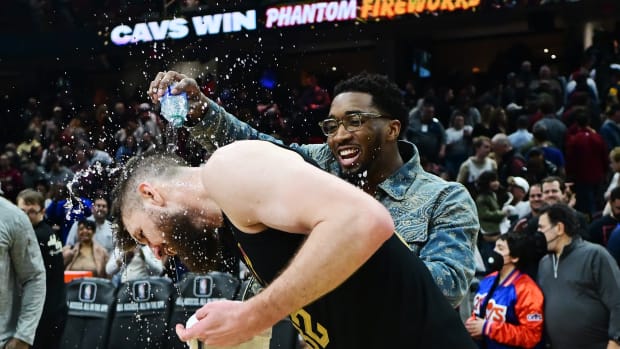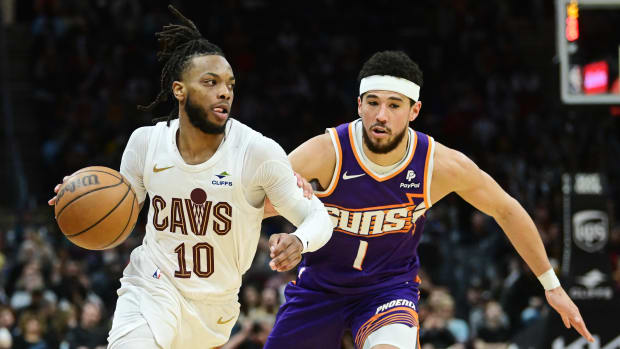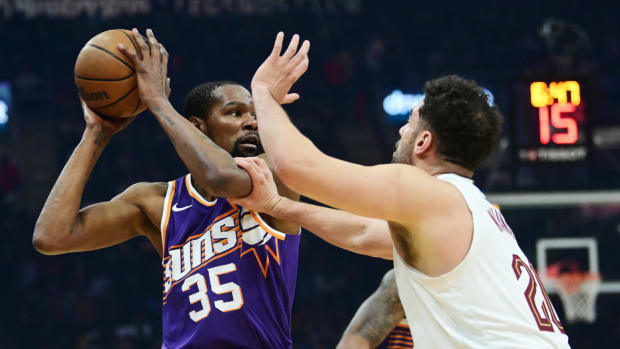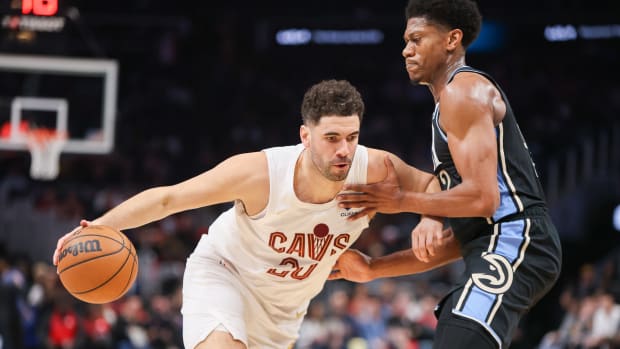
Q&A: Pacers scout Powell sees it all
When I spoke to Indiana Pacers advanced scout Jimmy Powell, he was in his car, pulled over and idling in the parking lot of a fast-food restaurant outside of Charlotte.
He was on his way to Atlanta for the Grizzlies vs. Hawks preseason game.
I thanked him for the time and explained that I wanted to learn a little bit about the life and tasks of an NBA advanced scout. To my surprise, he actually thanked me for the opportunity to talk about a job he loves but isn't all that visible to or well-understood by most fans.
Below is my extended interview with Jimmy Powell, basketball lifer, a man who once played for Donnie Walsh, had coached at all levels of the game, and then settled quite comfortably into his current role as the NBA's dean of advanced scouts:
How much preparation goes into the raw logistics of your job?
Answer: It takes nearly a month to schedule my travel for the entire year. As soon as the NBA schedule is released in August, I get to work putting a plan in place. I always want to make sure I'm not wasting my time or the organization's money. I end up seeing about 130 games a year, about four or five games a week.
What's your typical in-season travel schedule look like?
A: On average, I'm home in Massachusetts about 6-8 days a month and on the road about 22 days. My job really has no home games -- traveling is obviously a huge part of the job. Even when I'm scouting a game at Boston, I may not make it home because I live 80 miles away from the city.
When you're watching another team, what specifically are you looking for or trying to accomplish?
A: My job is primarily to try and match the other teams' sets with the verbal calls. This is information you can really only get in person at the game, you can't get it off the tape. Ultimately, I'm building a playbook on each team. By the end of the season, I have some pretty thick playbooks. Some teams might have over 100 calls, others as little as 30.
Aside from having to match sets with verbal calls on the fly, what’s your biggest challenge in putting together a useful playbook?
A: Sometimes, honestly, the biggest challenge is getting a good seat for the game. You kind of need to be down close to the action to do my job well. About five or six teams don’t give you a good seat, so I almost have to be a lip-reader at times. There are some organizations that are great, I can always count on a good seat. Toronto is one that comes to mind.
After you've completed a report, what do you do with it?
A: I send all my work to the assistant coaches. The Pacers only employ three assistants, by the way, which is because of Larry (Bird) -- he and I came from a different era where you didn’t need six assistants huddled around the head coach at the free-throw line during every time out.
Anyway, our three coaches split the league up and take about 10 teams each. I send my report to all of them via email. Sometimes they will call me with specific questions but not very often. If they do call with a question, it's usually to clarify one of the calls I've included in the report. What's nice is, if I want, I can call other teams' advanced scouts to help validate what I think I'm seeing.
There were reports last year that David Blatt wasn't really coaching the Cavs. You're in a unique position to comment on that with insight and not speculation. What's your take on Blatt?
A: The Cavs' playbook was actually very detailed, they had a lot of plays. But look, LeBron is a very cerebral player, he's like a coach on the court, and David Blatt had never been in the NBA. That's not a criticism of Blatt at all, but last year, LeBron knew the NBA game better than him. I think Blatt will be better this year because he's changed his playbook. I can see it already.
What do you see about Blatt and the Cavs' that has changed?
A: First, it was never true that Blatt didn't coach them. I don't share in that criticism of him because I'm down on the court, I see all the other decisions that he and all coaches make. It's not just calling an offensive set -- there are so many decisions made in an NBA game. But at the end of the day, if you have Larry Bird or LeBron or Paul George on your team, any smart coach will want the ball in their hands. There's no real call for LeBron penetrating, getting a double team and dropping it off for an easy bucket.
So if you were coaching a star player, how would you adjust your playbook?
A: First off, once the quarter is inside seven minutes, you're naturally going to make less calls. You want LeBron or Paul (George) or whoever your star is to control the ball at that point. That's good coaching. One more thing on Blatt: The best thing he did was scrap most of the Princeton offense. Really, why run an offense that might consistently have LeBron on the weak side, well off the ball, with 8 seconds on the shot clock?
Q: You think the Princeton offense isn’t a fit in the NBA?
A: Not really, I never understood why teams tried to exclusively run it. With the 24-second shot clock -- and it's really more like an 18-second shot clock once you cross half court -- there can be too many passes in the Princeton offense for a lot of success in the NBA game. Some elements of it are good, but applying it as a system, especially with a star like LeBron, doesn't make a lot of sense to me.
Q: Is there a tried and true path to becoming an advanced scout in the NBA?
A: There are all different paths. Some people come from coaching, others come through the video room. Lots of different scenarios. But look, a lot of people don’t stay with it because it's a grind.
Q: What was your path to this job?
A: I was a collegiate head coach for 16 years and then an assistant coach in the NBA. I ended up as the Pacers advanced scout for quite a few reasons. One, they gave me a super offer because it allowed me to stay in the X's and O's of the game. I didn't want to scout college players. I love X's and O's. But I was fired as a coach, twice, in Denver and Vancouver, so I was ready for some stability. This job gave me everything I wanted. But look, it's difficult, too -- I’m sitting in a Burger King parking lot talking to you right now.
You are one of the more tenured advanced scouts in the NBA? What’s the key to your longevity?
A: Yes, 18 years as an advanced scout, and that longevity is because of the Pacers franchise. It's a great franchise. So successful. On the coaching front, it started with Larry (Bird) and has continued with Frank (Vogel). The Pacers make this job enjoyable. Donnie Walsh and Larry Bird are very loyal to their staff, and they're both extremely bright. It really doesn't get any better than those two guys.
You played for Donnie Walsh, so you've got some history with him.
A: Yes, I played for Donnie at South Carolina. Donnie is unique -- he was a college coach but also a lawyer. So he understands the NBA game from every angle. There's nobody smarter than Donnie Walsh in basketball. Look, he was smart enough to get Larry.
Were there any players you saw in the past 18 years who you thought were under the radar and went on to succeed in the league?
A: The big thing I look at with players who aren't stars or established starters is body language. I'm good with body language. If I see a guy who's under the radar and he piques my interest, I might call (Pacers assistant coach) Dan Burke and say, "Hey, I like this guy, if he's ever available, we should take a look at him." One guy I bothered the organization about quite a bit was Shaun Livingston. He had size, great attitude, but he was kind of bouncing around the league for awhile. I loved the way he played. I told our guys, "Hey, Livingston doesn't cost much, his knee looks fine, he's a good kid, we should go get him." We passed on him, but he's obviously found some success since then.
Anyone else?
A: George Hill was another guy. Even as Tony Parker's backup, I thought he had potential to be very good. We hit on that one.
Jeff Kasler covers the Pacers and NBA for Amico Hoops. Twitter: @JKaslerHoops.





